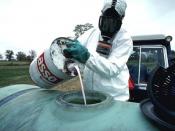Pesticides are used to kill insects, weeds, and other unwanted living things. The effects of pesticides are not limited to the plants to which they are applied. They also affect human, animals, and the environment. The scientific research that describes the impact of pesticides indicates that pesticides affect reproduction, growth, neurological development, and the function of the immune and endocrine systems. The wildlife toxicity data has shown that the young tend to exhibit greater sensitivity to pesticides. Other studies show that the effects of pesticides can be transmitted from one generation to the next. Exposure to pesticides can result in acute or chronic effects on health.
Chronic health effects of pesticides typically include cancer, interference with the development of the fetus and child, and disruption of the reproductive, endocrine, immune and/or central nervous systems. Controversial research has found that children develop leukemia three-to-nine times more often when pesticides are used around their homes.
Other cancers, including brain tumors and breast cancer, have also been linked to pesticide exposure. Organochiorines are subjected of aggravating certain chronic health problems in humans such as cancer, weakened immune systems and the disruption of hormonal functions.
Dr. Pierre Mineau, a researcher with Environment Canada's Canadian Wildlife Service, has shown that some pesticides can kill instantly. A single granule of carbofuran can be instantly lethal to a small bird. A pesticide called terbufos has a kill rate of about 50%. Another pesticide called organochiorines has also been found in human breast milk, and is known for reducing fertility in birds and thinning their eggshells.
The chlorophenoxy pesticide includes two herbicide chemicals, 4-D and MCPA. These chemicals can be moderately irritating to the skin and eyes. Inhalation of spray mist may cause coughing and a burning sensation in the nasal passages and chest. Prolonged inhalation...


